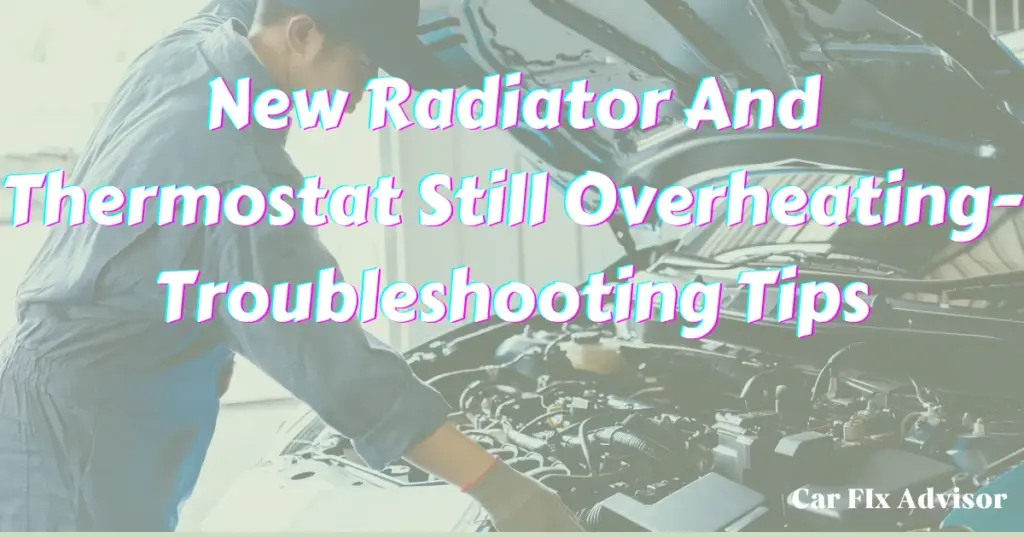You’ve installed a new radiator and thermostat, but your car still overheats. Frustrating, right?
Many car owners face this issue despite replacing key parts. Overheating can be caused by various factors beyond just the radiator and thermostat. Understanding these can help you diagnose and fix the problem. In this guide, we will explore why New Radiator And Thermostat Still Overheating even after replacing it.
We will also provide tips to solve these issues. By the end, you’ll have a clearer idea of what might be wrong with your car and how to address it. Stay with us as we uncover the possible culprits and solutions for your overheating engine.

Why this happen: Common Causes
Air pockets in the cooling system can cause overheating. They block the flow of coolant. This makes it hard for the engine to stay cool. To fix this, you need to bleed the system. This removes the trapped air. It’s a simple but important step.
A faulty water pump can also be a problem. It might not circulate the coolant properly. This leads to overheating. Check the water pump for leaks or damage. If it is broken, you will need to replace it. A working water pump is key to a cool engine.
Radiator Issues
Even with a new radiator and thermostat, a car can still overheat. Possible causes include air pockets or coolant leaks. Check hoses and ensure proper coolant levels.
Clogged Radiator
A clogged radiator can cause overheating. Dirt and debris block the flow of coolant. This means the engine can’t cool down. Over time, the blockage gets worse. It’s important to clean the radiator often. This keeps the coolant flowing well.
Radiator Cap Problems
A faulty radiator cap can also cause issues. The cap keeps the system under pressure. If it doesn’t work, the coolant can boil. This leads to overheating. Checking the cap is easy. Make sure it fits tightly. Replace it if it’s old or worn out.
Thermostat Problems
Incorrect installation can cause your car to overheat. The thermostat must fit perfectly. If it’s not, the engine may get too hot. It’s important to follow the manual. A small mistake can lead to big problems. The thermostat should open and close at the right time. If it doesn’t, overheating can happen.
A defective thermostat can cause trouble. It may stay shut when it should open. This blocks coolant flow. The engine then overheats. Always check the thermostat. A faulty one needs a quick replacement. Never ignore the signs of a bad thermostat. It can damage your engine.

Credit: www.youtube.com
Coolant System
The right coolant mix is vital. Use equal parts of water and coolant. This helps the engine stay cool. Too much water can cause rust. Too much coolant can cause overheating. Always check the coolant type in your car’s manual.
Leaks can cause overheating. Check hoses and connections for leaks. Look for puddles under the car. Blockages in the coolant system can also cause problems. Dirt and debris can block the radiator. Regular checks keep the system clean.
Engine Components
A head gasket failure can cause your engine to overheat. This issue can lead to coolant leaks and loss of pressure. If the coolant leaks into the engine, it can cause smoke. You may also notice white smoke from the exhaust. Another sign is oil mixing with the coolant. This can damage the engine further.
Blown fuses can also make the engine overheat. Fuses protect the cooling system. If a fuse blows, the radiator fan might stop working. This stops the engine from cooling down. Check the fuses if you notice heating issues. Replace any blown fuses quickly.
Sensor And Gauge
A faulty temperature sensor can cause overheating. It may send wrong signals. The engine may not cool down properly. This sensor reads the engine’s heat. If it fails, the car’s computer may not know the real temperature. Replacing it may solve the problem. Always check the sensor first.
A broken temperature gauge can show wrong readings. It might say the engine is hot when it’s not. This can lead to confusion. Drivers may think there’s a problem. Replacing the gauge can help. Always ensure the gauge works well. It helps to avoid overheating issues.
Fan Issues
The fan motor helps cool the engine. A faulty fan motor can cause overheating. It may stop working completely. This means air won’t flow to cool the radiator. Listen for unusual noises from the fan. Strange sounds mean trouble. A burning smell is also a bad sign. Check the fan motor and replace it if needed.
The relay switch controls the fan. If the relay switch fails, the fan won’t turn on. This can cause the engine to overheat. Test the relay switch with a multimeter. Look for signs of wear and tear. If the relay switch is broken, replace it immediately. A working relay switch is essential for cooling the engine.
Troubleshooting Steps
First Steps:
- Check the radiator for any visible damage or leaks.
- Look at the hoses for cracks or wear. Make sure there are no blockages in the radiator fins.
- Inspect the thermostat housing and make sure it is not leaking.
- Check the coolant level in the radiator and refill if needed.
Second Steps:
- First, test the thermostat by heating it in water. Use a thermometer to check if it opens at the correct temperature.
- Second, test the radiator for proper flow. Use a garden hose to see if water flows freely through the radiator.
- Lastly, test the coolant. Use a coolant tester to ensure it is effective and not old.

Credit: www.reddit.com
FAQs about New Radiator And Thermostat Still Overheating
How To Tell If A Water Pump Or Thermostat Is Bad?
Check for coolant leaks, overheating, or unusual noises. Observe inconsistent engine temperature or heater malfunction. Monitor warning lights.
Why Is My Radiator Thermostat Off But The Radiator Is Still Hot?
A faulty valve might be causing your radiator to stay hot. The thermostat could also be malfunctioning. Check for trapped air or system issues.
Why Is My Car Still Overheating After Changing The Head Gasket?
Your car might still overheat due to issues like a faulty thermostat, water pump, radiator, or air in the cooling system.
How Do You Bleed A Radiator After Replacing A Thermostat?
To bleed a radiator after replacing a thermostat, turn off the heating system. Use a radiator key to open the bleed valve. Allow trapped air to escape until water flows steadily. Close the valve securely. Repeat for each radiator if needed.
Conclusion
Resolving car overheating issues can be challenging. Even with new parts, problems persist. Check for other potential issues. Look at hoses, water pump, and fans. Regular maintenance helps prevent overheating. Seek professional help if issues continue. Proper diagnostics ensure your car runs smoothly.
Stay proactive with vehicle care. Your car will thank you.
